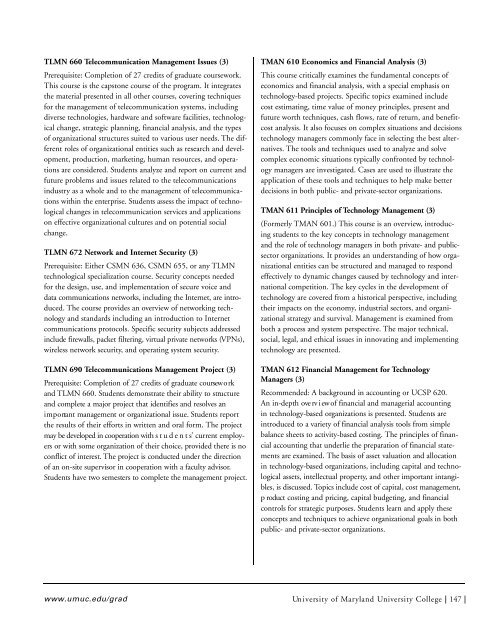A+B. Intro_SJ.1 - University of Maryland University College
A+B. Intro_SJ.1 - University of Maryland University College
A+B. Intro_SJ.1 - University of Maryland University College
Create successful ePaper yourself
Turn your PDF publications into a flip-book with our unique Google optimized e-Paper software.
TLMN 660 Telecommunication Management Issues (3)<br />
Prerequisite: Completion <strong>of</strong> 27 credits <strong>of</strong> graduate coursework.<br />
This course is the capstone course <strong>of</strong> the program. It integrates<br />
the material presented in all other courses, covering techniques<br />
for the management <strong>of</strong> telecommunication systems, including<br />
diverse technologies, hardware and s<strong>of</strong>tware facilities, technological<br />
change, strategic planning, financial analysis, and the types<br />
<strong>of</strong> organizational structures suited to various user needs. The different<br />
roles <strong>of</strong> organizational entities such as research and development,<br />
production, marketing, human resources, and operations<br />
are considered. Students analyze and report on current and<br />
future problems and issues related to the telecommunications<br />
industry as a whole and to the management <strong>of</strong> telecommunications<br />
within the enterprise. Students assess the impact <strong>of</strong> technological<br />
changes in telecommunication services and applications<br />
on effective organizational cultures and on potential social<br />
change.<br />
TLMN 672 Network and Internet Security (3)<br />
Prerequisite: Either CSMN 636, CSMN 655, or any TLMN<br />
technological specialization course. Security concepts needed<br />
for the design, use, and implementation <strong>of</strong> secure voice and<br />
data communications networks, including the Internet, are intro -<br />
duced. The course provides an overview <strong>of</strong> networking technology<br />
and standards including an introduction to Internet<br />
communications protocols. Specific security subjects addressed<br />
include firewalls, packet filtering, virtual private networks (V P N s ) ,<br />
wireless network security, and operating system security.<br />
TLMN 690 Telecommunications Management Project (3)<br />
Pre requisite: Completion <strong>of</strong> 27 credits <strong>of</strong> graduate coursew o rk<br />
and TLMN 660. Students demonstrate their ability to stru c t u re<br />
and complete a major project that identifies and re s o l ves an<br />
i m p o rtant management or organizational issue. Students report<br />
the results <strong>of</strong> their efforts in written and oral form. The project<br />
may be developed in cooperation with s t u d e n t s’ current employers<br />
or with some organization <strong>of</strong> their choice, provided there is no<br />
conflict <strong>of</strong> interest. The project is conducted under the dire c t i o n<br />
<strong>of</strong> an on-site supervisor in cooperation with a faculty advisor.<br />
Students have two semesters to complete the management project.<br />
TMAN 610 Economics and Financial Analysis (3)<br />
This course critically examines the fundamental concepts <strong>of</strong><br />
economics and financial analysis, with a special emphasis on<br />
technology-based projects. Specific topics examined include<br />
cost estimating, time value <strong>of</strong> money principles, present and<br />
future worth techniques, cash flows, rate <strong>of</strong> return, and benefitcost<br />
analysis. It also focuses on complex situations and decisions<br />
technology managers commonly face in selecting the best alternatives.<br />
The tools and techniques used to analyze and solve<br />
complex economic situations typically confronted by technology<br />
managers are investigated. Cases are used to illustrate the<br />
application <strong>of</strong> these tools and techniques to help make better<br />
decisions in both public- and private-sector organizations.<br />
TMAN 611 Principles <strong>of</strong> Technology Management (3)<br />
(Formerly TMAN 601.) This course is an overview, introducing<br />
students to the key concepts in technology management<br />
and the role <strong>of</strong> technology managers in both private- and publicsector<br />
organizations. It provides an understanding <strong>of</strong> how organizational<br />
entities can be structured and managed to respond<br />
effectively to dynamic changes caused by technology and international<br />
competition. The key cycles in the development <strong>of</strong><br />
technology are covered from a historical perspective, including<br />
their impacts on the economy, industrial sectors, and organizational<br />
strategy and survival. Management is examined from<br />
both a process and system perspective. The major technical,<br />
social, legal, and ethical issues in innovating and implementing<br />
technology are presented.<br />
TMAN 612 Financial Management for Technology<br />
Managers (3)<br />
Recommended: A background in accounting or UCSP 620.<br />
An in-depth ove rv i ew <strong>of</strong> financial and managerial accounting<br />
in technology-based organizations is presented. Students are<br />
i n t roduced to a variety <strong>of</strong> financial analysis tools from simple<br />
balance sheets to activity-based costing. The principles <strong>of</strong> financial<br />
accounting that underlie the preparation <strong>of</strong> financial statements<br />
are examined. The basis <strong>of</strong> asset valuation and allocation<br />
in technology-based organizations, including capital and technological<br />
assets, intellectual pro p e rt y, and other important intangibles,<br />
is discussed. Topics include cost <strong>of</strong> capital, cost management,<br />
p roduct costing and pricing, capital budgeting, and financial<br />
c o n t rols for strategic purposes. Students learn and apply these<br />
concepts and techniques to achieve organizational goals in both<br />
public- and private-sector organizations.<br />
w w w. u m u c . e d u / g r a d<br />
Un i versity <strong>of</strong> Ma r yland Un i versity <strong>College</strong> | 147 |

















